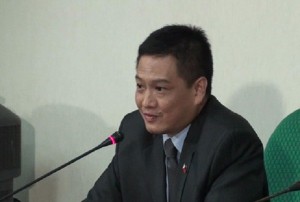Another setback for FOI bill

Deputy Speaker Lorenzo Tañada III had said that if the bill was not sponsored on the floor Wednesday, prospects for its passage may dim. INQUIRER.net FILE PHOTO
The much awaited introduction of the freedom of information (FOI) bill on the floor of the House of Representatives was delayed anew after a controversy over another matter—a local government measure—sparked the suspension of Tuesday’s legislative session.
“This does not look good,” said Deputy Speaker Lorenzo Tañada III, one of the FOI bill’s advocates, but he said he still held out some hope the bill may yet pass muster even with only seven session days left before Congress adjourns to give way to the election period.
Before the FOI bill could be introduced on the floor, Davao del Sur Rep. Marc Douglas Cagas sought an adjournment to prevent the House from reading into the records the new law creating the province of Davao Occidental.
Tañada said he would have objected to Cagas’ motion, but there was no quorum. There were not enough lawmakers around, he explained.
Davao Occidental was carved out of Davao del Sur, and Cagas had opposed the move, which was authored by his political opponent.
Article continues after this advertisementTañada said he and other lawmakers tried to prevail on Cagas not to move for adjournment, but the latter was adamant in opposing the reading of the republic act on Davao Occidental.
Article continues after this advertisementAbsurd situation
The House leadership could not have postponed the reading of that law into the records because it was listed in the order of business, Tañada added.
“It’s very absurd that a parochial issue stops a bill we can all agree [is] a bill of national importance such as the FOI,” he said.
The FOI bill adopts a government policy of full public disclosure of transactions involving public interest, subject to certain limitations or exemptions on the disclosure of information related to national security and defense.
Tañada had said that if the bill was not sponsored on the floor Wednesday, prospects for its passage may dim. He earlier criticized Samar Rep. Ben Evardone, public information committee chairman, for not introducing the bill earlier so the period of debates and amendments can begin.
“At the end of the day, it doesn’t look good for the whole house,” he added.
“We will try again tomorrow,” Tañada had said.
The Senate has already passed its version of the FOI bill on third and final reading.
Earlier setback
Earlier, the bill seemed to suffer a setback when members of the party-list coalition Makabayan announced it was withdrawing its co-authorship of the FOI bill because it did not agree with the exemptions introduced by Malacañang.
The exemptions Makabayan wants removed include matters of executive privilege, data pertaining to military and police operations, drafts of executive orders, and minutes of meetings. The militants said they would try to remove these exceptions during the period of amendments.
Malacañang defended these exemptions, saying public disclosure of all discussions (in minutes of meetings) may inhibit Cabinet members and other participants from expressing their views frankly and candidly.
When asked if the President would certify this bill as urgent as he had done in the case of the reproductive health bill, Undersecretary Abigail Valte, deputy presidential spokesperson, replied:
“Perhaps at this point it’s not about the importance (of the bill) but whether the discussions have fully threshed out the issue at hand.”
Extensive deliberation
If anything, it needs “extensive deliberation,” she said.
Responding to arguments that the exemptions on executive privilege were “too broad,” Valte said Malacañang had in fact eased up earlier proposed exemptions.
“In some of the versions, executive privilege extended up to local government officials who would have interaction with the President. We said it should not reach that level. It could be up to the rank of undersecretary, or a sub-Cabinet post,” she said.
As to the exemptions on national security, Valte said details of an ongoing operation by law enforcement agencies could definitely not be divulged. But she said the bill provides for a declassification of documents after a certain period.
Valte said the exemption of national security matters from public disclosure was recognized by the country’s jurisprudence, and by other countries enforcing similar FOI laws.
She said Malacañang was pushing for an FOI bill granting people access to information vital to public interest “without hampering necessarily the work of government.”